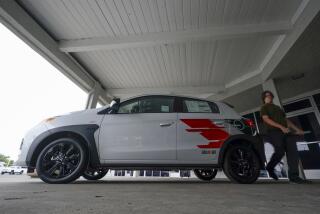In Japan, a Lexus just doesn’t have that cachet
- Share via
TOKYO — These days no one scoffs at Toyota Motor Corp., the world’s most profitable auto manufacturer with an apparently fine-tuned sense of what drivers want.
So it may be hard to recall the skepticism in the 1980s when this Japanese company, known then for engineering dependable cars at affordable prices, announced plans to crash the luxury car club controlled by iconic names such as Mercedes, BMW and Cadillac.
Today, Toyota’s luxury Lexus sedans, coupes and sport utility vehicles are clogging country club parking lots across America.
Lexus has been the bestselling luxury car in the U.S. for the last six years. Its quiet ride and sleek style give middlebrow Toyota something to appeal to the driver who covets bells and whistles such as an eight-speed automatic transmission, seats that give massages and 19 -- yes, 19! -- surround-sound speakers.
Yet in Japan, most luxury car buyers have eyeballed the Lexus, kicked its tires and said, “Give me something European.”
Germany’s Mercedes and BMW are still the luxury cars of choice in Japan. Mercedes, owned by DaimlerChrysler, sold more than 58,000 cars in Japan last year; BMW has delivered 38,400 in the first 10 months of 2006.
Japan may not be the world’s biggest market for premium cars, but it’s one with growing demand and a consumer thirst for the extras that make for healthy profits.
When Lexus made its debut in Japan in September last year, Toyota executives said they expected to sell 50,000 to 60,000 vehicles in the first year. They have sold just half that after more than 14 months on the market.
“The reality is that, ironically for Toyota, Japan is proving to be a difficult market,” said Christopher Richter, an auto industry analyst at CLSA Asia Pacific in Tokyo. “Their difficulty here is that there is greater panache in owning a Mercedes or a BMW. In the U.S., the Lexus is a sensible reward for personal success.
“But in Japan, people want something that says, ‘Hey, I spent stupid money on a car.’ ”
Getting that kind of reaction with a Lexus is difficult in Japan, where the name still means Toyota and doesn’t generate much of a frisson. Unlike in the U.S., where Toyota established Lexus as an independent premium brand, Lexus models sold in Japan were all previously marketed as Toyotas: the Altezza, the Aristo, the Soarer and the Celsior.
“Lexus models are just changed models of Toyota cars that didn’t sell well in Japan,” said Makiteru Ishikawa, an auto industry journalist and a panelist who helps select the prestigious Japan Car of the Year.
He said Toyota’s corporate culture remained too focused on high volumes, failing to understand that premium cars must be exclusive, not just expensive.
Toyota executives acknowledge that the launch has been slower than hoped.
“We don’t know why they are a little more cautious about buying Japanese for luxury,” said Paul Nolasco, a Toyota spokesman in Tokyo. The problem is not that no one knows the Lexus name, he said.
Toyota’s research surveys put Lexus brand awareness at 84% of potential car buyers, about 10 percentage points below BMW and Mercedes but still a high level of penetration.
The problem is that Lexus is far behind Mercedes when respondents were asked whether the car represented luxury (though it polled roughly the same as BMW in that category).
Japan is a fiercely competitive playing field for the world’s biggest brands. Luxury items such as handbags and jewelry prospered even during Japan’s prolonged recession of the 1990s.
Last spring, Louis Vuitton chose Tokyo to host the first ready-to-wear catwalk show outside of Paris. Gucci just opened a flagship store in Tokyo’s pricey Ginza district. But Japanese consumers seem reluctant to put Lexus in this rarified category.
“I know the mechanics of Japanese cars are excellent, but to me, the outside looks are similar to every other Japanese car,” said Emi Bamba, 57, who has been driving a Mercedes for the last 20 years.
She drove a Cadillac before that after she saw how easily her Japanese Mazda was crushed in a traffic accident. “Japanese cars don’t make any impact on me,” Bamba said.
That failure is clearly galling to Toyota, which is accustomed to generating mostly happy corporate news. Toyota is not just the world’s most profitable auto manufacturer. It is in the passing lane preparing to overtake General Motors Corp. as the world’s largest seller of cars.
With its pioneering hybrid cars, Toyota continues to swipe market share from Detroit’s automakers and saw its profit soar to $3.44 billion in the last fiscal quarter alone.
Toyota’s Nolasco said the news wasn’t all bad. Sales of Lexus’ IS and GS sedan series have captured nearly one-third of the market against the Mercedes and BMW brands they compete against, he said. And in September, Toyota added the LS460 to the lineup, selling 12,000 of its most extravagant model so far.
Toyota’s competitors aren’t about to gloat -- publicly, at least.
“A Lexus is essentially a Toyota in the minds of Japanese consumers, and Toyota focused for decades on serving a mass market, so the Japanese see Toyotas as a mass product,” said Yuchiro Ito, a spokesman for BMW Japan. “But Toyota is extremely serious about developing a serious product, and once they have put the Lexus models through a full cycle of changes, the real battle will begin.”
Other observers point to wider problems in the world’s second-largest car market. Sales of regular passenger vehicles are declining in Japan, a worrying trend that may be hard to reverse as long as the country’s population continues to shrink.
The domestic auto industry is being sustained mostly by an unexpected boom in minis: small passenger vehicles that weigh about half a normal passenger car and are on average 40% more fuel efficient. Japanese manufacturers sold more than 1 million minis in the first half of 2006.
Some see this development as a sign of a new caution among Japanese consumers, a search for value and performance that may play to Lexus’ strengths.
“The people buying Lexus now tend to be small company owners who live in small towns,” said auto journalist Ishikawa, who says most Lexus drivers are over 40. “They don’t want to be regarded as rich or rumored to have made money by doing something wrong. And small company presidents whose businesses deal with Toyota only buy Toyota cars, even if they have the money to buy Mercedes or BMW.”
Nolasco said Toyota could generate buzz for the Lexus with changes in design and styling. And the Lexus LS460 has features aimed at anticipating the needs of drivers and passengers, such as infrared sensors that read body temperatures and then provide each rider with individually attuned climate control.
But critics like Ishikawa say Toyota needs to think about the driving experience. He drove the LS460 and found it flawless. “It ran fast, powerful and safe,” he said. But there was a deficit in the pizazz department.
“There is no characteristic that brings pleasure in owning it or a feeling that it is fun to drive,” he said. “If cars can be said to represent the national culture, then Toyota Lexus is the car that represents Japan.
“It is a straight-A student.”
Naoko Nishiwaki of The Times’ Tokyo bureau contributed to this report.






